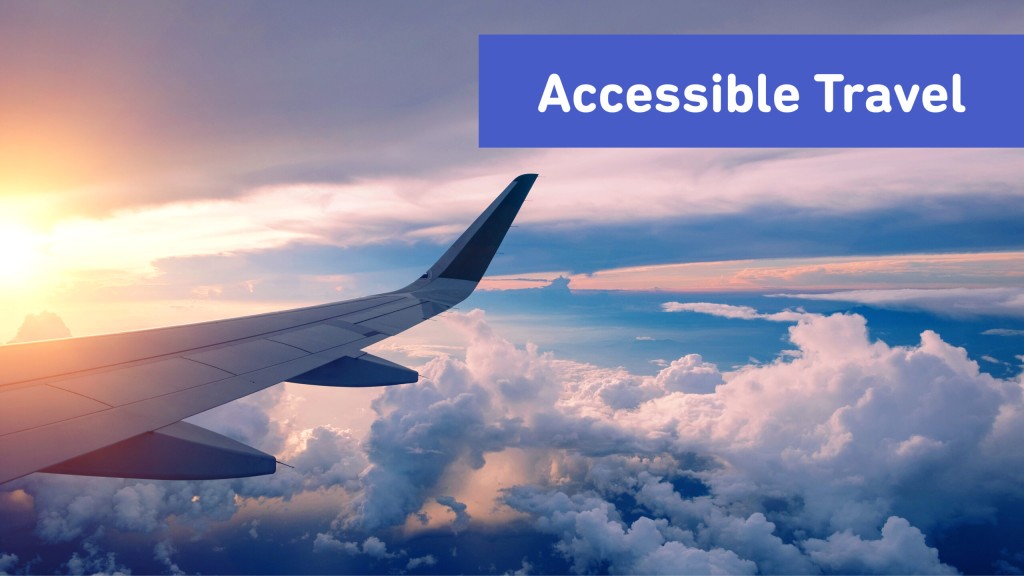
Improving Air Travel for People Living with a Disability
By MDA Staff | Monday, September 27, 2021
Broken wheelchairs. Inaccessible seating. Hard to navigate aircraft. For too many in the neuromuscular community, traveling by air is not accessible. We sat down with Paul Melmeyer, MDA’s VP of Public Policy and Advocacy to hear about his recent appointment to the Air Carrier Access Act Advisory Committee and the Association’s work on accessible air travel.
- What is the ACAA Advisory Committee?
The ACAA Advisory Committee was created as part of the Federal Aviation Administration (FAA) reauthorization in 2018. It is comprised of representatives of stakeholder groups with an interest in airline accessibility, including disability advocacy organizations, service animal providers, airlines, airports, wheelchair manufacturers, and more. Together we discuss and recommend new policies and approaches to the Department of Transportation on how to make air travel more accessible.
- What does it mean to be a Member?
To be a member of the ACAA Advisory Committee you must serve or represent a stakeholder community impacted by efforts to make air travel more accessible. MDA is a member because many individuals in the neuromuscular disease community use wheelchairs and other mobility devices and are often adversely impacted by inaccessible air travel. We hear from community members all the time about broken wheelchairs, inaccessible lavatories, the indignity of aisle chairs, and more. Because we are a member of the ACAA Advisory Committee, we can bring these experiences directly to the regulators themselves: the Department of Transportation.
- How will the ACAA Advisory Committee help those living with a disability travel by air?
The Advisory Committee gives disability advocates a direct line of communication to the Department of Transportation and other key decisionmakers to make recommendations and advocate for change. Community viewpoints on how to make ticketing, the use of service animals, planing and deplaning, the use of lavatories, and other experiences more accessible. We hope that MDA’s contributions, as well as those of other disability advocates, will lead to the Department of Transportation requiring airlines to be more accessible for those with disabilities.
- How’d the last Committee Meeting go? What was discussed and decided?
The Advisory Committee discussed a number of items, including a disability bill of rights, accessible ticketing practices, stowage of wheelchairs in the cargo hold of airplanes, training of airport and airline employees, and more. For each topic covered, specific recommendations were made from the Advisory Committee to the Department of Transportation. Many were incremental in nature, including the publishing of best practices for airlines and airports as well as commissioning additional studies and reports on the topics discussed. Elsewhere more tangible recommendations were made, including requiring airlines and airports to routinely update an individual with a disability if assistance for planing or deplaning is delayed.
- What’s next after this Meeting? When could people living with a disability see changes while traveling by air?
The next step is for the Advisory Committee to author an official report and recommendations to send to the Department of Transportation and Congress. From there, we will advocate for the adoption of the recommendations, hoping that if adopted they will make a tangible difference in the experiences of those with disabilities traveling by air. The Advisory Committee will continue its work, but because current Committee members are only allowed to serve a single term that will expire next year, MDA’s appointment will expire after the report is authored and other disability advocates will take the seat.
- How else is MDA working to make air travel more accessible?
MDA is working to make air travel more accessible on multiple fronts. In addition to the Advisory Committee, MDA joins with other advocacy organizations to call for the enactment of the Air Carrier Access Amendments Act, a bill to make air travel much more accessible. You can join us in supporting this legislation by contacting your members of Congress to ask them to co-sponsor the legislation. MDA also partners with other advocates to push for regulatory changes that govern air travel accessibility.
- Is there anything else you want to add?
Yes! October marks the 35th anniversary of the enactment of the Air Carrier Access Act. MDA will be joining events and celebrations throughout the month, so stay tuned! Additionally, a recent report from the US Access Board, commissioned by Congress, outlined what steps are necessary to allow for wheelchair users to stay in their wheelchairs on the planes. We will be looking for ways to make the recommendations of this report a reality.
To join our advocacy efforts, please go to mda.org/advocacy or text MDAUSA to 504-57.
Disclaimer: No content on this site should ever be used as a substitute for direct medical advice from your doctor or other qualified clinician.




